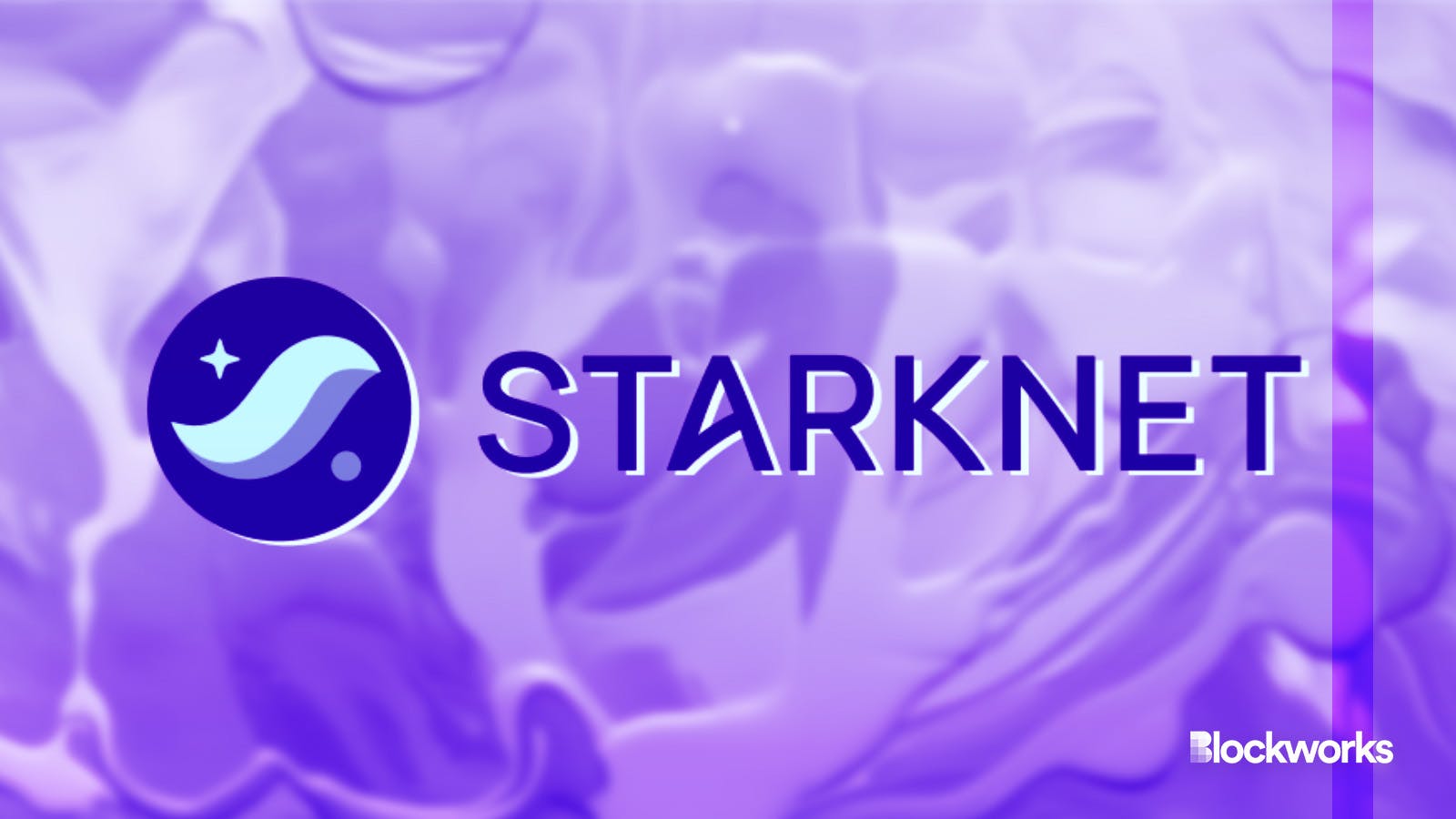Starknet plans ‘broad’ token distribution starting later this month
The long-awaited Starknet native asset STRK will soon be in the hands of 1.3 million eligible wallets

Starknet and Adobe Stock modified by Blockworks
The native token of Starknet, the blockchain developed by zero-knowledge proof pioneer StarkWare, will be distributed beginning Feb. 20.
The STRK token will be distributed to almost 1.3 million eligible wallets in what the Starknet Foundation called Wednesday the “broadest distribution of its kind” to date.
Solo stakers on Ethereum running up to 12 validators stand to gain a hefty windfall with thousands of tokens allocated per validator, according to a Starknet Foundation blog post. The token will also go directly to Ethereum developers but — in a first — to non-Web3 open source software developers as well, based on their GitHub contributions.
The goal is to set a precedent of inclusivity, according to Diego Oliva, CEO of the Starknet Foundation (SNF).
Read more: Bitcoin’s first zero-knowledge light client seeks to drive innovation
“This technology is new and potentially impactful for applications across industries, and many leaders in related technological spaces deserve to have a stake in what’s to come,” Oliva said.
The SNF is distributing STRK as part of its role promoting adoption of Starknet, but unlike many community incentive campaigns, the token carries utility within the network beyond its role in governance.
Yes, STRK holders will be able to vote on major changes to the protocol, but they can also pay network fees (or gas) in STRK as an alternative to ether (ETH). The token is also expected to play a role in the security of Starknet in the future via staking, much as ether does today on the Ethereum mainnet.
The SNF refers to the token distribution as “provisions” rather than an airdrop, and has released a detailed explanation of eligibility criteria along with an address checker via a “Provisions Portal.”
Read more: Starknet Foundation teases STRK token airdrop
A diverse set of Starknet users, contributors and developers will be able to grab part of the 900 million STRK tokens on offer — 9% of the 10 billion total supply.
Of these, most of the STRK tokens are allocated to Starknet users, subject to activity and volume criteria. A smaller pool will reward early adopters of StarkWare technology.
“Members of the community have been battle testing STARK-based technology since StarkEx went live in 2020, and we’re glad that many of those who interacted with StarkEx-powered dapps like dYdX, ImmutableX, Rhinofi and Sorare are being recognized today,” StarkWare co-founder Eli Ben-Sasson said.
In absolute terms, the largest allocation is carved out for some 2,000 people who qualified under Starknet’s Early Community Members’ Program (ECMP), with some receiving as many as 180,000 tokens.
The dollar value of the tokens is not yet available, since they are not trading, but comparable layer-2 networks Arbitrum (ARB), Optimism (OP) and Polygon (MATIC) have fully-diluted valuations between $8 billion and $20 billion.
Starknet attempted to tailor token eligibility criteria to mitigate Sybil attacks of the airdrop. Criteria for user contributions specifically exclude repetitive operations typical of Sybils and bots, the SNF said.
Starknet collaborated with Trust Labs to screen users as of Nov. 15, 2023 and received a usage snapshot from the StarkWare team for StarkEx users prior to June 1, 2022.
“To better decentralize the network, real users with genuine interest in participating in guiding and governing Starknet should be the ones empowered,” the SNF blog reads.
Around 5 billion STRK tokens (49.9% of the total supply) are allocated to “core contributors” and “investors” subject to a one-year cliff that expires on April 15, 2024, with a linear release over four years thereafter.
But substantial reserves remain unallocated and the SNF promises further token distributions in the future. StarkWare’s Ben-Sasson noted that his team remains “heads down, coding and building,” as the project reaches this significant milestone.
“Provisions celebrates our community’s hard work in showing how we can and should scale Ethereum for mass adoption,” Oliva said.
Get the news in your inbox. Explore Blockworks newsletters:
- The Breakdown: Decoding crypto and the markets. Daily.
- 0xResearch: Alpha in your inbox. Think like an analyst.






